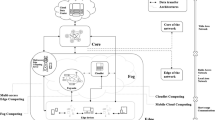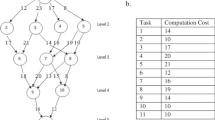Abstract
The rapid development of IoT-based services has resulted in an exponential increase in the number of connected smart mobile devices (SMDs). Processing the massive data generated by the large number of SMDs is becoming a big problem for mobile devices, servers, and wireless communication channels. A Multi-access Edge Computing (MEC) paradigm partially mitigates this problem by deploying edge server nodes at the edge of wireless networks nearby SMDs, but the challenge still remains due to the limited computation capacity of MEC servers and the bandwidth of wireless channels. In addition, the dependency of tasks generated by applications on SMDs increases the complexity of the problem. In this paper, we propose a constrained multiobjective computation offloading optimization solution to resolve the problem of task dependency under limited resources. This solution improves the Quality of Service (QoS) through minimizing the latency, energy consumption, and rate of task failure caused by limited resources. We propose a two-staged hybrid computation offloading optimization method to solve the problem. In the first stage, the computation offloading decisions are made based on the preferences of tasks. Then, in the second stage, nearly optimal solutions are found using the modified Non-Dominated Sorting Genetic Algorithm (NSGA-III). The overall efficiency of the proposed method is increased owing to the preference-based algorithm reinforcing the NSGA-III algorithm by generating a better initial population. The results of extensive experiments show that the efficiency of the proposed method is significantly better than the existing methods.






Similar content being viewed by others
Data availibility statement
Not applicable.
References
Bharadwaj HK, Agarwal A, Chamola V, Lakkaniga NR, Hassija V, Guizani M, Sikdar B (2021) A review on the role of Machine Learning in enabling IoT based healthcare applications. IEEE Access 9:38859–38890. https://doi.org/10.1109/ACCESS.2021.3059858
Khanna A, Kaur S (2020) Internet of things (IoT), applications and challenges: A comprehensive review. Wirel Pers Commun 114(2):1687–1762. https://doi.org/10.1007/s11277-020-07446-4
Mach P, Becvar Z (2017) Mobile edge computing: A survey on architecture and computation offloading. IEEE Commun Surv Tutorials 19(3):1628–1656. https://doi.org/10.1109/COMST.2017.2682318
Hu J, Li K, Liu C, Li K (2020) Game-based task offloading of multiple mobile devices with qos in mobile edge computing systems of limited computation capacity. ACM Trans Embed Comput Syst 19(4). https://doi.org/10.1145/3398038
Liu M, Yu FR, Teng Y, Leung VCM, Song M (2019) Distributed resource allocation in blockchain-based video streaming systems with mobile edge computing. IEEE Trans Wirel Commun 18(1):695–708. https://doi.org/10.1109/TWC.2018.2885266
Zhou J, Zhang X, Wang W (2019) Joint resource allocation and user association for heterogeneous services in multi-access edge computing networks. IEEE Access 7:12272–12282. https://doi.org/10.1109/ACCESS.2019.2892466
Yi C, Cai J, Su Z (2020) A multi-user mobile computation offloading and transmission scheduling mechanism for delay-sensitive applications. IEEE Trans Mob Comput 19(1):29–43. https://doi.org/10.1109/TMC.2019.2891736
Zhang L, Cao B, Li Y, Peng M, Feng G (2021) A multi-stage stochastic programming-based offloading policy for Fog enabled IoT-eHealth. IEEE J Sel Areas Commun 39(2):411–425. https://doi.org/10.1109/JSAC.2020.3020659
Qiao B, Liu C, Liu J, Hu Y, Li K, Li K (2021) Task migration computation offloading with low delay for mobile edge computing in vehicular networks. Concurr Comput Pract Exp 34(1). https://doi.org/10.1002/cpe.6494
Zhang J, Xia W, Yan F, Shen L (2018) Joint computation offloading and resource allocation optimization in heterogeneous networks with mobile edge computing. IEEE Access 6:19324–19337. https://doi.org/10.1109/ACCESS.2018.2819690
Liu P, Xu G, Yang K, Wang K, Meng X (2019) Jointly optimized energy-minimal resource allocation in cache-enhanced mobile edge computing systems. IEEE Access 7:3336–3347. https://doi.org/10.1109/ACCESS.2018.2889815
Yang L, Zhong C, Yang Q, Zou W, Fathalla A (2020) Task offloading for directed acyclic graph applications based on edge computing in industrial internet. Inf Sci 540:51–68. https://doi.org/10.1016/j.ins.2020.06.001
Shen S, Han Y, Wang X, Wang Y (2020) Computation offloading with multiple agents in edge-computing-supported IoT. TOSN 16(1):8–1827. https://doi.org/10.1145/3372025
Afrin M, Jin J, Rahman A, Tian Y, Kulkarni A (2019) Multi-objective resource allocation for edge cloud based robotic workflow in smart factory. Future Gener Comput Syst 97:119–130. https://doi.org/10.1016/j.future.2019.02.062
Xu X, Fu S, Yuan Y, Luo Y, Qi L, Lin W, Dou W (2019) Multiobjective computation offloading for workflow management in cloudlet-based mobile cloud using NSGA-II. Comput Intell 35(3):476–495. https://doi.org/10.1111/coin.12197
Cui L, Xu C, Yang S, Huang JZ, Li J, Wang X, Ming Z, Lu N (2019) Joint optimization of energy consumption and latency in mobile edge computing for Internet of Things. IEEE Internet Things J 6(3):4791–4803. https://doi.org/10.1109/JIOT.2018.2869226
Alkhalaileh M, Calheiros RN, Nguyen QV, Javadi B (2020) Data-intensive application scheduling on mobile edge cloud computing. J Netw Comput Appl 167. https://doi.org/10.1016/j.jnca.2020.102735
Xia S, Yao Z, Li Y, Mao S (2021) Online distributed offloading and computing resource management with energy harvesting for heterogeneous MEC-enabled IoT. IEEE Trans Wirel Commun 20:6743–6757. https://doi.org/10.1109/TWC.2021.3076201
Cui Y, Zhang D, Zhang T, Chen L, Piao M, Zhu H (2020) Novel method of mobile edge computation offloading based on evolutionary game strategy for iot devices. AEU-Int J Electron C 118. https://doi.org/10.1016/J.AEUE.2020.153134
Tong Z, Deng X, Ye F, Basodi S, Xiao X, Pan Y (2020) Adaptive computation offloading and resource allocation strategy in a mobile edge computing environment. Inf Sci 537:116–131. https://doi.org/10.1016/j.ins.2020.05.057
Chalapathi GSS, Chamola V, Johal W, Aryal J, Buyya R (2022) Energy and latency aware mobile task assignment for green cloudlets. Simul Model Pract Theory. https://doi.org/10.1016/j.simpat.2022.102531
Chakraborty S, Mazumdar K (2022) Sustainable task offloading decision using genetic algorithm in sensor mobile edge computing. Journal of King Saud University - Computer and Information Sciences 34(4):1552–1568. https://doi.org/10.1016/j.jksuci.2022.02.014
Zhang W, Wen Y (2018) Energy-efficient task execution for application as a general topology in mobile cloud computing. IEEE Trans. Cloud Comput 6(3):708–719. https://doi.org/10.1109/TCC.2015.2511727
Li Y, Xia S, Zheng M, Cao B, Liu Q (2022) Lyapunov optimization-based trade-off policy for mobile cloud offloading in heterogeneous wireless networks. IEEE Trans Cloud Comput 10(1):491–505. https://doi.org/10.1109/TCC.2019.2938504
Jiang C, Cheng X, Gao H, Zhou X, Wan J (2019) Toward computation offloading in edge computing: A survey. IEEE Access 7:131543–131558. https://doi.org/10.1109/ACCESS.2019.2938660
Gasmi K, Dilek S, Tosun S, Ozdemir S (2022) A survey on computation offloading and service placement in fog computing-based IoT. J Supercomput 78(2):1983–2014. https://doi.org/10.1007/s11227-021-03941-y
Sadatdiynov K, Cui L, Zhang L, Huang JZ, Salloum S, Mahmud MS (2022) A review of optimization methods for computation offloading in edge computing networks. Digital Communications and Networks. https://doi.org/10.1016/j.dcan.2022.03.003
Guo S, Liu J, Yang Y, Xiao B, Li Z (2019) Energy-efficient dynamic computation offloading and cooperative task scheduling in mobile cloud computing. IEEE Trans Mob Comput 18(2):319–333. https://doi.org/10.1109/TMC.2018.2831230
Yang L, Cao J, Cheng H, Ji Y (2015) Multi-user computation partitioning for latency sensitive mobile cloud applications. IEEE Trans Comput 64(8):2253–2266. https://doi.org/10.1109/TC.2014.2366735
Orhean AI, Pop F, Raicu I (2018) New scheduling approach using reinforcement learning for heterogeneous distributed systems. J Parallel Distrib Comput 117:292–302. https://doi.org/10.1016/j.jpdc.2017.05.001
Pan S, Zhang Z, Zhang Z, Zeng D (2019) Dependency-aware computation offloading in mobile edge computing: A reinforcement learning approach. IEEE Access 7:134742–134753. https://doi.org/10.1109/ACCESS.2019.2942052
Deb K, Pratap A, Agarwal S, Meyarivan T (2002) A fast and elitist multiobjective genetic algorithm: NSGA-II. IEEE Trans Evol Comput 6(2):182–197. https://doi.org/10.1109/4235.996017
Deb K, Jain H (2014) An evolutionary many-objective optimization algorithm using reference-point-based nondominated sorting approach, part I: solving problems with box constraints. IEEE Trans Evol Comput 18(4):577–601. https://doi.org/10.1109/TEVC.2013.2281535
Jain H, Deb K (2014) An evolutionary many-objective optimization algorithm using reference-point based nondominated sorting approach, part II: handling constraints and extending to an adaptive approach. IEEE Trans Evol Comput 18(4):602–622. https://doi.org/10.1109/TEVC.2013.2281534
Xu X, Liu Q, Luo Y, Peng K, Zhang X, Meng S, Qi L (2019) A computation offloading method over big data for IoT-enabled cloud-edge computing. Future Gener. Comput Syst 95:522–533. https://doi.org/10.1016/j.future.2018.12.055
Mao Y, Zhang J, Letaief KB (2016) Dynamic computation offloading for mobile-edge computing with energy harvesting devices. IEEE J Sel Areas Commun 34(12):3590–3605. https://doi.org/10.1109/JSAC.2016.2611964
Jafari AH, López-Pérez D, Song H, Claussen H, Ho LTW, Zhang J (2015) Small cell backhaul: challenges and prospective solutions. EURASIP J Wirel Commun Netw 2015:206. https://doi.org/10.1186/s13638-015-0426-y
Shah B, Dalwadi G, Shah H, Kothari N (2018) Power-efficient lte macro enodeb: A comprehensive survey. Telecommun Radio Eng 77(16). https://doi.org/10.1615/TelecomRadEng.v77.i16.40
Shortle JF, Thompson JM, Gross D, Harris CM (2018) Fundamentals of Queueing Theory, 5th edn. Wiley Series in Probability and Statistics. Wiley
Das I, Dennis JE (1998) Normal-boundary intersection: A new method for generating the pareto surface in nonlinear multicriteria optimization problems. SIAM J Optim 8(3):631–657. https://doi.org/10.1137/S1052623496307510
Zhao T, Zhou S, Guo X, Niu Z (2017) Tasks scheduling and resource allocation in heterogeneous cloud for delay-bounded mobile edge computing. In: IEEE International Conference on Communications, ICC 2017. Paris, France, May 21-25, 2017, pp 1–7. IEEE. https://doi.org/10.1109/ICC.2017.7996858
Heris MK (2015) NSGA-II in MATLAB. Yarpiz. https://yarpiz.com/56/ypea120-nsga2. Accessed 05 July 2022
Heris MK (2016) NSGA-III: Non-dominated Sorting Genetic Algorithm, the Third Version - MATLAB Implementation. Yarpiz. https://yarpiz.com/456/ypea126-nsga3. Accessed 05 July 2022
Heris MK (2015) Multi-Objective PSO in MATLAB. Yarpiz. https://yarpiz.com/59/ypea121-mopso. Accessed 05 July 2022
Funding
This work has been partially supported by the National Key R &D Program of China under Grant No. 2018YFB1800805, the National Natural Science Foundation of China under Grant No. 61772345, 61902257, 61972261, the Pearl River Young Scholars funding of Shenzhen University, and the Shenzhen Science and Technology Program under Grant No. RCYX20200-714114645048, No. JCYJ20190808142207420, and No. GJHZ2-0190822095416463.
Author information
Authors and Affiliations
Contributions
Kuanishbay Sadatdiynov: Conceptualization, Investigation, Software, Methodology, Writing - original draft. Laizhong Cui: Conceptualization, Project administration, Resources, Validation. Joshua Zhexue Huang: Supervision, Funding acquisition, Methodology, Writing - review & editing.
Corresponding author
Ethics declarations
Ethical approval and consent to participate
Yes.
Human and animal ethics
Not applicable.
Consent for publication
Yes.
Competing interests
The authors declare that they have no competing interests.
Additional information
Publisher’s Note
Springer Nature remains neutral with regard to jurisdictional claims in published maps and institutional affiliations.
Rights and permissions
Springer Nature or its licensor (e.g. a society or other partner) holds exclusive rights to this article under a publishing agreement with the author(s) or other rightsholder(s); author self-archiving of the accepted manuscript version of this article is solely governed by the terms of such publishing agreement and applicable law.
About this article
Cite this article
Sadatdiynov, K., Cui, L. & Huang, J. Offloading dependent tasks in MEC-enabled IoT systems: A preference-based hybrid optimization method. Peer-to-Peer Netw. Appl. 16, 657–674 (2023). https://doi.org/10.1007/s12083-022-01435-z
Received:
Accepted:
Published:
Issue Date:
DOI: https://doi.org/10.1007/s12083-022-01435-z




